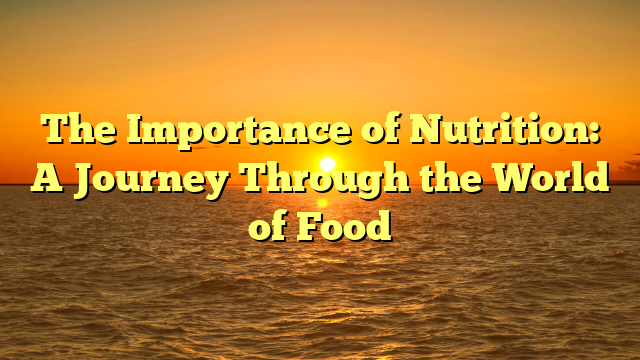
Food is a fundamental aspect of human life. It sustains us, fuels our bodies, and brings
people together. From basic nutrients to complex flavors, the world of food is vast and
diverse. Whether it’s for survival, pleasure, or social interaction, food plays a central role in
our lives. In this article, we will explore the importance of nutrition, the benefits of diverse
food choices, and how our eating habits impact our health and well-being.
The Basics of Nutrition
Nutrition is the science of how food affects the body. It involves understanding the nutrients
we get from food and how they are used by our bodies to function properly. Nutrients are
substances needed for growth, metabolism, and other bodily functions. The six major
classes of nutrients are carbohydrates, proteins, fats, vitamins, minerals, and water.
Carbohydrates: These are the body’s primary source of energy. They come in two forms:
simple and complex. Simple carbohydrates are sugars, while complex carbohydrates are
starches and fiber found in foods like grains, legumes, and vegetables.
slot mahjong : Proteins are essential for building and repairing tissues, producing enzymes and
hormones, and supporting immune function. They are made up of amino acids, some of
which are essential, meaning the body cannot produce them, so they must be obtained from
food.
Fats: Fats are a concentrated source of energy and are important for the absorption of
fat-soluble vitamins (A, D, E, and K). There are healthy fats, like those found in nuts, seeds,
and fish, and unhealthy fats, like trans fats and excessive saturated fats, found in processed
foods.
Vitamins and Minerals: These are micronutrients that help regulate metabolism, protect
against disease, and ensure proper cell function. Each vitamin and mineral has its own
specific role, and deficiencies can lead to a range of health problems.
Water: Often overlooked, water is crucial for the body’s basic functions. It helps in digestion,
circulation, absorption of nutrients, and temperature regulation.
The Role of Food in Health
Food not only provides us with energy but also plays a significant role in preventing and
managing chronic diseases. For example, a balanced diet rich in fruits, vegetables, whole
grains, and lean proteins can help reduce the risk of heart disease, diabetes, and certain
cancers.
Heart Health: Diets high in fruits, vegetables, and whole grains and low in saturated fats can
help lower cholesterol levels and reduce the risk of cardiovascular disease. Foods like fatty
fish, rich in omega-3 fatty acids, are known to have heart-protective benefits.
Bone Health: Foods rich in calcium and vitamin D, such as dairy products, leafy greens, and
fortified cereals, are essential for maintaining strong bones and preventing osteoporosis,
particularly as we age.
Immune Function: Vitamins and minerals like vitamin C, vitamin D, and zinc play crucial roles
in immune health. A well-balanced diet, rich in these nutrients, can support the body’s ability
to fight infections and stay healthy.
Mental Health: Emerging research suggests that diet plays a role in mental well-being.
Omega-3 fatty acids, found in fish, as well as antioxidants from fruits and vegetables, may
help alleviate symptoms of depression and anxiety.
The Global Variety of Food
Food is not only about nutrition but also about culture, tradition, and the joy of eating. Every
culture has its own culinary traditions, influenced by geography, climate, and history.
Whether it’s the rich flavors of Mediterranean cuisine, the spice-laden dishes of India, or the
hearty meals of northern Europe, food reflects the values and history of a region.
Mediterranean Diet: Known for its heart-healthy benefits, this diet emphasizes fruits,
vegetables, whole grains, olive oil, fish, and moderate wine consumption. The Mediterranean
diet has been linked to lower risks of heart disease, obesity, and cancer.
Asian Cuisine: Asian food, such as Chinese, Japanese, and Thai, often uses fresh
vegetables, rice, noodles, and soy products. Many Asian cuisines feature fermented foods
like kimchi or miso, which offer digestive benefits and probiotics.
Latin American Food: Latin American cuisine is diverse, with dishes from Mexico, Brazil, and
Argentina offering unique flavors. Staples like beans, corn, and rice are central to many
meals, providing essential nutrients while maintaining cultural significance.
Food Trends and Sustainability
As the world becomes more interconnected, global food trends also emerge. In recent years,
there has been a growing emphasis on sustainable eating habits, such as plant-based diets
and ethical sourcing of food. These trends focus not only on the health benefits but also on
the environmental impact of food choices.
Plant-Based Diets: Vegan and vegetarian diets, which focus on plant-based foods, have
become increasingly popular due to their potential health benefits and lower environmental
footprint. Reducing meat consumption can decrease greenhouse gas emissions, conserve
water, and reduce deforestation.
Sustainable Sourcing: Consumers are becoming more conscious of the environmental and
ethical implications of food production. Choosing locally sourced, organic, and sustainably
produced food is gaining momentum, as people recognize the need for more responsible
food production practices.
Food Waste: Food waste is another major issue facing the global food system. In many parts
of the world, food is thrown away in vast quantities, contributing to environmental
degradation and hunger. Reducing food waste by buying only what is needed, composting,
and using leftovers is a critical step toward improving sustainability.
The Joy of Sharing Food
Beyond its nutritional and cultural significance, food is a means of connection. Shared meals
help strengthen relationships, whether with family, friends, or colleagues. There’s something
deeply satisfying about sitting down together and enjoying a meal. This communal aspect of
food fosters a sense of belonging, celebration, and comfort.
In many cultures, food is central to holidays, celebrations, and rituals. Whether it’s a
Thanksgiving dinner in the U.S., a family barbecue in Australia, or a holiday feast in Italy,
food has the power to bring people together, creating lasting memories and shared
experiences.
Conclusion
Food is so much more than a source of nourishment. It is an essential part of our daily lives,
impacting our health, culture, and society. By understanding the role of nutrition, embracing
a balanced and diverse diet, and being mindful of sustainability, we can improve our
well-being and contribute to a healthier planet. Ultimately, food is not just about what we eat
but how we connect with one another, celebrate traditions, and live sustainably. Let us
remember that every meal is an opportunity to nourish our bodies, minds, and relationships.




